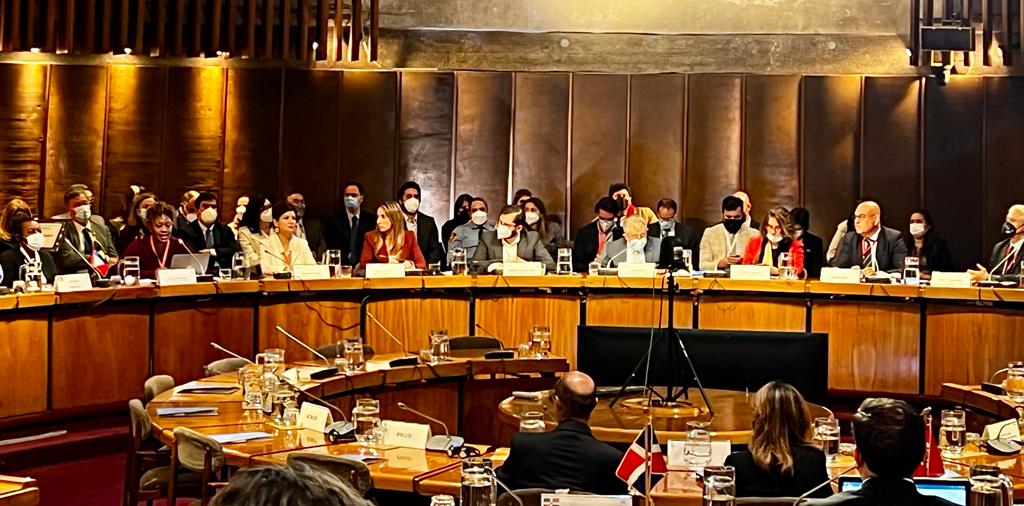
Civil society congratulates the twelve State Parties and calls on the other countries of Latin America and the Caribbean to ratify and adhere to the Escazú Agreement as soon as possible, thereby achieving greater protection for environmental defenders in the region.
One year after the entry into force of the Escazú Agreement, the first meeting of the Conference of the Parties (COP 1) of the Escazú Agreement is taking place between April 20-22, 2022, where the rules of procedure will be defined to guide its implementation in Latin America and the Caribbean. In this context, organizations from the entire region will participate in the Conference, with the aim of guaranteeing standards of participation that leave no one behind.
The Escazú COP is being held at the headquarters of the Economic Commission for Latin America and the Caribbean (ECLAC), in Santiago, Chile. Official representatives of the countries that are part of the Agreement, Observers and of those that are in the process of becoming parties are present. Thus, this is a key moment for the implementation of the Escazú Agreement, since in this first COP the rules that will lay the foundation for the effective implementation of the treaty will be adopted, among which are the financial provisions necessary for the implementation of the Agreement; the rules for the structure and function of the Committee to Support Implementation and Compliance and the procedural rules of the COP itself will be down for consideration.
Escazú – Focus on participation
Public participation in the implementation of the Escazú Agreement is fundamental; especially, with a view to ensuring that there are mechanisms for the implementation of the treaty in an effective, inclusive and diversified manner; that is, with representation from unions, women, human rights defenders, indigenous organizations, youth, and community organizations, among others.
Similarly, for civil society, the rules of the Committee to Support Implementation and Compliance are essential to ensure the effective application of the Agreement. For this reason, we believe that the rules must ensure an adequate composition of the Committee, taking into account regional, ethnic and gender diversity, and the meaningful participation of the public in the process of presenting communications and in the hearings of complaints of non-compliance. Likewise, it is essential that the Committee has the capacity to adopt protection measures for petitioners who are in situations of risk.
On the other hand, the Rules of Procedure must ensure broad public participation, maintaining and strengthening the participation standards by which the Escazú negotiation process has been characterized. The rules must ensure that representatives of the public have a place at the COP and with the Presiding Officers. It must also consider that any person registered in the Regional[1] Public Mechanism can participate directly and be informed of the meetings of the COP, with access to all the information and documents in advance, and be able to convey the proposals and contributions that they consider necessary.
Better environmental and legal protection for defenders
Despite the fact that the recognition and protection generated by the Agreement have begun to contribute to a change in the narrative surrounding the defense of environmental rights, violence is on the rise. Once again, last year, Latin America was recognized as the most dangerous region for human rights and environmental defenders, with Colombia for the second consecutive year being the country in the world where the most defenders are killed, closely followed by Mexico, Brazil, Honduras, Guatemala, Nicaragua and Peru. As a result of this, in the Amazon basin, the indigenous peoples have declared themselves in constant emergency due to the growing violence and state inaction.
In this first COP of the Escazú Agreement, the party countries need to accelerate action regarding its implementation. In relation to those countries that have not yet ratified or adhered, they must continue working to become a Party to the Agreement very soon. We cannot continue to accumulate such growing figures of defenders being killed, exiled or threatened. We need Escazú Now.
Additional Information
The twelve State Parties are participating in the first Escazú COP; that is, those States that have ratified the treaty. The first country to ratify was Guyana. Other States Parties from the Caribbean are Antigua and Barbuda, St. Kitts and Nevis, Saint Lucia and St. Vincent and the Grenadines.
Also, any other government of Latin America and the Caribbean will be present and may participate. However, only the State Parties have the right to vote, with a view to adopting:
The procedural rules of the Conference of the Parties hereafter, including the period of the COP and public participation.
The Escazú Committee to Support Implementation and Compliance, which will be made up of independent experts from the region, and who will monitor compliance with the Escazú Agreement by the State Parties.
In addition to the official program of the Escazú COP, where these decisions will be made, there will be parallel events on topics such as the situation of human rights defenders, the impact of the environment with a gender perspective, among others.
The complete Escazú COP programme is available at: https://acuerdodeescazu.cepal.org/cop1/es and the official activities of the event will be available at: https://live.cepal.org/escazu
The Escazú Agreement entered into force on April 22, 2021, 90 days after it reached the eleven required ratifications, as established by the treaty itself.
To date, of the twenty-four signatory countries of the Agreement, twelve are pending ratification. In addition, in South America, countries such as Chile, Venezuela, and Suriname have not yet signed it. In the case of Chile, on March 18, President Gabriel Boric signed the project for accession to the treaty, which was sent to Congress to approve its accession.













